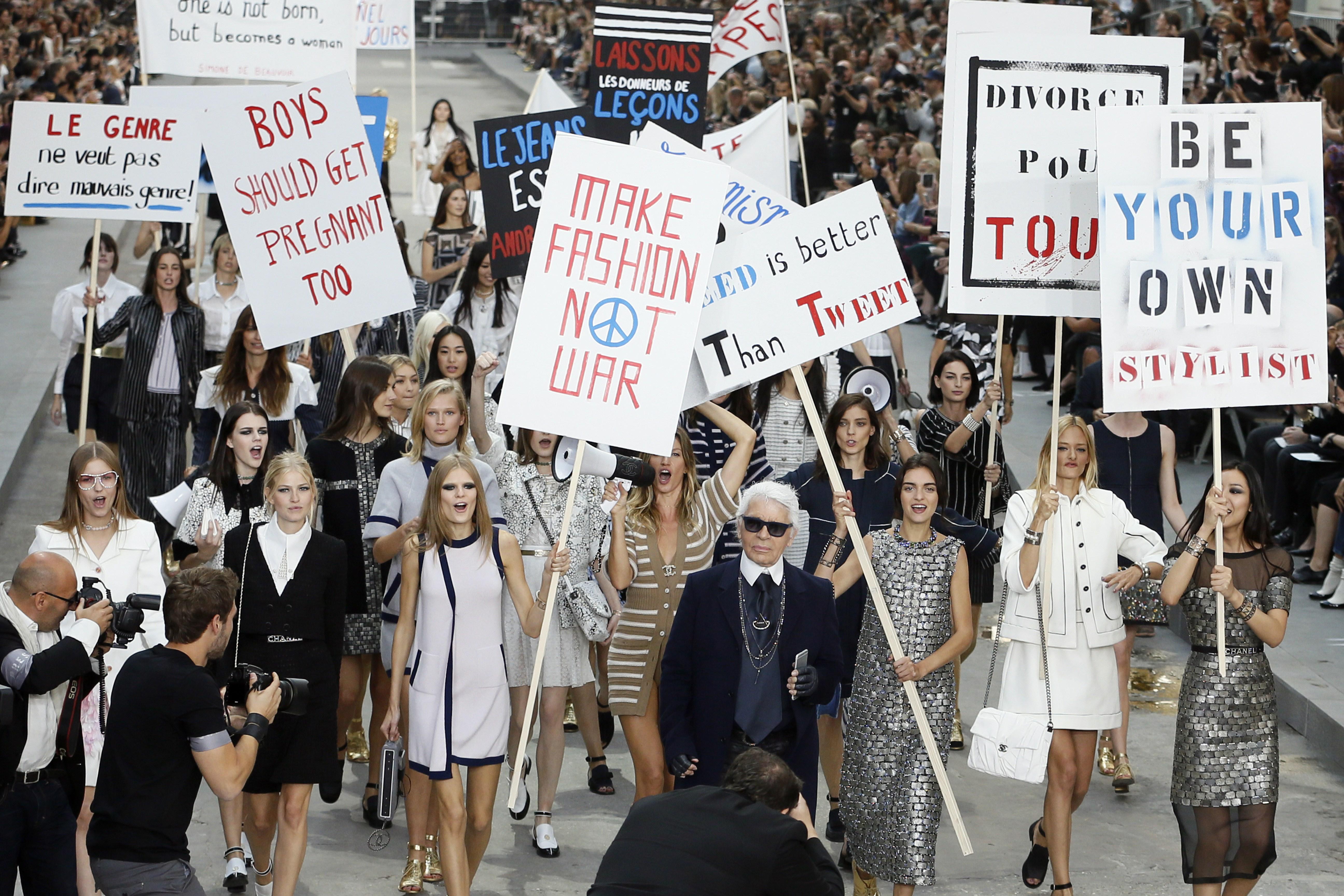Last year, actress Ellen Page expressed disappointment that many of her fellow actresses have disavowed the feminist label. “How could it be any more obvious that we still live in a patriarchal world when feminism is a bad word?” she told Guardian reporter Hadley Freedman. Feminism, she said, “always gets associated with being a radical movement—good. It should be.” But at this point, the feminist label is no longer particularly radical, or even necessarily political. It’s just good branding.
This week, Karl Lagerfeld promoted his spring 2015 Chanel line with a runway feminist march where models led by Cara Delevingne carried picket signs reading things like “Be Your Own Stylist,” “Feminist but Feminine,” and “Free Freedom,” to the tune of Chaka Khan’s “I’m Every Woman.” And Emily Ratajkowski—the topless dancer from Robin Thicke’s “Blurred Lines” video turned Gone Girl movie star—told Cosmopolitan magazine that she feels lucky that she can “wear what she wants, sleep with whom she wants, and dance how she wants, while still being a feminist.”
These feminist statements are sublime in their lack of substance. Are figures like Lagerfeld and Ratajkowski promoting feminism, or just using feminism to promote themselves? It’s impossible to tell. For a new crop of celebrities, feminism can signify absolutely anything—or to put it another way, nothing. The important thing is just saying the word where somebody hears you.
Well, we asked for it. Feminists have been campaigning for female celebrities to champion the label for years. Every time a famous woman claims that she is not a feminist—from Taylor Swift’s “I don’t really think about things as guys versus girls” to Lady Gaga’s “I’m not a feminist, I hail men”—their statements are denounced as not just wrong about feminism, but wrong about themselves. (As Maureen O’Connor put it in The Cut last year, “When it comes to click bait headlines, ‘is not a feminist’ is the female media equivalent of ‘nip slip.’”) When Shailene Woodley disavowed feminism this year, Women and Hollywood’s Melissa Silverstein penned Woodley an open letter instructing her that feminism simply means “the belief that men and women should have equal rights and opportunities,” and that Woodley herself was already basically a feminist, whether she likes it or not. “If there was no feminism you would not be a movie star,” Silverstein wrote. BuzzFeed responded to Woodley’s quote with a list of the “21 Most Feminist Things Shailene Woodley Has Ever Said.”
This argument—that feminism is so commonsensical that all famous women already embody it, no matter what they believe—has, in recent months, proven to be an easy sell. “I feel like I’m one of the biggest feminists in the world because I tell women to not be scared of anything,” Miley Cyrus said in November of last year. (Compared to “I hail men,” “women shouldn’t live in fear” is practically misandrist.) Swift, too, has come around. “As a teenager, I didn’t understand that saying you’re a feminist is just saying that you hope women and men will have equal rights and equal opportunities,” Swift said in August. It’s not clear whether she believes that wish has come true, or what ought to be done about it. Whatever it is, she’s doing it: She recently realized she’s “been taking a feminist stance without actually saying so.”
But adopting the “feminist” label requires no stance. That means that female celebrities have been freed to use it in both incredibly exciting displays—as when Beyoncé stared down a crowd in front of an enormous glowing “FEMINIST” sign at the Video Music Awards in August—as well as co-opt it in the service of inane quotes. Who knows how the word will be redefined (or dropped) when the season changes. As Hollywood publicist Howard Bragman told the Washington Post’s Jessica Contrera, feminism may constitute a social justice movement for women around the world, but for celebrities, it’s “a moving target.”
